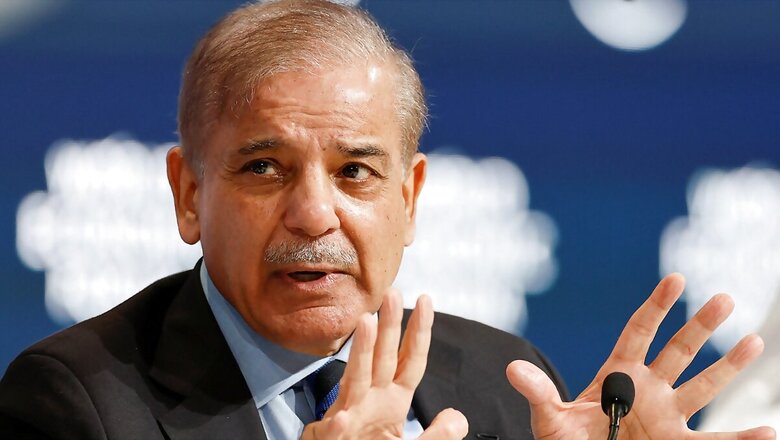
views
The International Monetary Fund (IMF), on Thursday, approved a $7 billion loan to cash-strapped Pakistan. The country is due to receive the first $1 billion of the loan immediately, with the balance to be paid out over the next three years. Prime Minister Shehbaz Sharif welcomed the decision and thanked IMF chief Kristalina Georgieva and her team.
Pakistan has relied on IMF loans to meet its needs for decades and continued to struggle after years of financial mismanagement. It has taken 24 loans from the IMF since 1958 and is currently its fifth-largest debtor. This is itself an indication of how Pakistan’s economy has been ailing for decades and continues to be on a downward slide.
The IMF has said that the new bailout programme “will require sound policies and reforms” to stabilise and help make the economy more resilient. On its part, Pakistan has pledged that it would be the last loan from the international lender. As part of the deal, the Shahbaz Sharif government has agreed to a number of unpopular measures, including increasing the amount of tax it collects from people and businesses.
It may be recalled that last year, Pakistan was on the brink of defaulting on its debts and had barely enough in foreign currencies to pay for a month of imports. In July 2023, the IMF approved a $3 billion bailout package for Pakistan, and it also received funds from Saudi Arabia and the UAE.
At that time, Shehbaz Sharif had said the bailout was a major step forward in efforts to stabilise the economy, and it would bolster Pakistan’s economic position and help to overcome immediate to medium-term economic challenges. However, Pakistan failed to stabilise its economy, and the common man’s miseries have continued to mount.
One consequence of the high cost of living is that beggars from Pakistan have been flooding cities in other countries and are found begging on the streets. Saudi Arabia recently asked Pakistan to prevent beggars from misusing Umrah visas to reach the holy cities of Mecca and Medina for begging. This trend of beggars abusing visas to beg in foreign countries also has Pakistan and its genuine Pakistani visa-seekers worried.
There is no doubt that Pakistan’s economy would improve vastly if it had friendly and cooperative relations with India. Trade with India would boost the economy. The trading community of Pakistan has been urging their government in this regard. In 2018-2019, Pakistan’s annual imports from India totalled around $2 billion, and its exports neared $500 million. Today, there is no formal trade. All goods must be funnelled through a third-country port such as Dubai or Singapore at added costs. In October 2022, Pakistan’s Finance Minister Ishaq Dar signalled a desire to reopen trade with India. He also said that many in Pakistan’s business community are keen to resume trade with India.
The Sharif family, which controls the ruling Pakistan Muslim League N (PMLN) party, has historically favoured closer ties with India. To a great extent, this is because it relies on the electoral support of the Punjabi trading community, whose interests are served by the border remaining open for commerce. This stance has frequently raised the ire of the country’s powerful military establishment and was a contributing factor in the breakdown of civil-military relations during the 2013-2018 government of Muhammad Nawaz Sharif.
India has repeatedly made it clear that a normal relationship with Pakistan is not possible unless it stops the policy of engaging in state-sponsored terrorism against it. Addressing an election rally in Nowshera recently on September 22, Union Home Minister Amit Shah said that the central government would not engage in any talks with Pakistan until terrorism in Jammu and Kashmir is eradicated. On the same day, while addressing an election rally in Rajouri, Defence Minister Rajnath Singh sent a message to Pakistan, saying, “We wish to have good relations with all our neighbouring countries, even with Pakistan. But if they keep encouraging terrorism, how can we have good relations with them? If they give a guarantee that they won’t let any terrorism happen in India, we are ready to have talks with them.”
The question arises: can Pakistan’s PM Shehbaz Sharif give such a guarantee? Can he take the initiative to end the policy of sponsoring terrorism and start talks with India?
Sadly, Pakistan is not a democracy where the elected government decides foreign policy. Rather, Pakistan is run by a ‘Deep State’ which is an unelected authority and which wields control over all important issues. The Deep State comprises the army and its intelligence wing, the ISI. The army is the final arbiter in politics and perhaps everything else.
We have repeatedly witnessed how civilian authority has been systematically humiliated, crushed, and demoralised in Pakistan. Prime Minister Zulfiqar Ali Bhutto tried to exert himself, but he was overthrown and later hanged by Gen Zia-ul-Haq. Nawaz Sharif stood up to Gen Musharraf but he was overthrown in a military coup and placed under arrest. Later on, he had to go into exile. More recently, Imran Khan tried to stand up to Army Chief Gen Asim Munir, but he was summarily overthrown and is still languishing in prison.
A hostile relationship with India serves the interests of the Pakistani Generals, for they are able to project themselves as the real defenders of Pakistan. If there is peace with India, the army would have to confine itself to the barracks. However, if there is hostility with India, the army is able to call the shots on the ground that it alone can protect the country. That is why their top military leaders have traditionally opposed the idea of a rapprochement with India because hostility serves their interests.
Ever since Pakistan was routed in the 1971 war and lost its eastern part, which became Bangladesh, Pakistani Generals have spoken about taking revenge and ‘bleeding India by a thousand cuts’. Being fully aware that an all-out war with India could be disastrous, Pakistani Generals want to destabilise India without actually going to war. They cannot overlook how the adventurous and cocky Musharraf had risked the Kargil war with India, in which Pakistan suffered a crushing defeat.
Knowing full well that India’s economic and military strength is much greater and that there is no way Pakistan can win a war against us, Pakistani Generals have based their strategy on carrying out covert warfare. They have tried to achieve this through terrorists who are trained by the Pakistani army and sent across the Line of Control to fight against Indian security forces. Simultaneously, there is an all-out effort by the Pakistani establishment to pass off these terrorists as indigenous Kashmiri freedom fighters.
With his government heavily reliant on the army to stay in power following a controversial election, Shehbaz Sharif is unlikely to be able to do anything that would go against the wishes of the Generals. Thus, it is too much to expect that the government of Shehbaz Sharif will be able to end terrorism against India when carrying out terrorist attacks against India has been the Pakistan army’s policy for decades and continues to be the same even now.
Because of its dominant role within the country, the army has been able to generate untold material benefits for itself, a fact that has become a source of resentment among the common people. This is especially visible in the real estate sector. Defence housing societies have been developed with vigour in many Pakistani cities, and army officers have got large plots of land at throwaway prices. Many Pakistanis feel that the army is misusing its position while also getting distracted from its actual role and functions.
Pakistan’s leading newspaper The Dawn had reported on January 1, 2019, that the then Chief Justice of Pakistan, Mian Saqib Nisar, had said while hearing a case pertaining to a defence housing society: “Is it the army’s job to develop housing societies? I ask you, the army, and everyone else this: Which country’s army operates housing schemes? The army’s job is to protect the country’s borders, not to participate in commercial activities,” the judge said, adding, “Had the Defence Housing Association done this for our martyrs, it would have been understandable.” The Chief Justice then commented: “Your name has been stained every time you have gone into housing schemes. It seems that you people run your business by using widows and martyrs as a shield, and you pocket royalties.”
Another interesting offshoot of the army ruling the roost in Pakistan is the Fauji Foundation, a corporate organisation run by the army. It has been expanded slowly and steadily and has now become one of the largest corporate groups in Pakistan. It is active in several areas such as fertilisers, cement, food, power generation, gas exploration, LPG marketing and distribution, financial services, and security services.
The Fauji Foundation is managed by the Pakistan army, with about 85-90 per cent of the positions filled by serving or retired personnel from the three armed forces. The managing director is usually an army General, and the Board of Directors is chaired by the Federal Secretary of Defence, with members drawn from within the army organisation. Naturally, all the plum positions in the Fauji Foundation go to senior Generals who are loyal to the Army Chief. It is cronyism of a sort, which could never have happened if the army had not completely ruled the roost.
It is the Pakistanis themselves who have to rectify the situation that exists in their country, though it will be a long haul for them. They have to wake up to the fact that their country is being run for the benefit of a privileged few and that the Generals are right at the top of this list. In this situation, it is difficult to redress public anger over the high cost of living, which is due to the poor state of the economy. Until the stranglehold of the military weakens, Pakistan’s economy will continue to face serious challenges. The military’s dominance over foreign policy will also ensure that Pakistan’s attitude towards India continues to be hostile, and we in India have to be prepared to combat the unending challenge of cross-border terrorism.
The writer is a retired Indian diplomat and had previously served as Consul General in New York. Views expressed in the above piece are personal and solely those of the author. They do not necessarily reflect News18’s views.




















Comments
0 comment